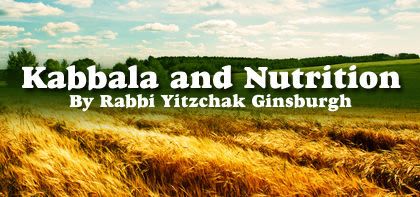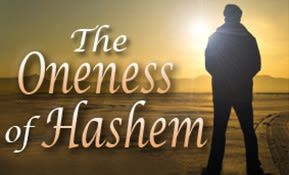
Kabbala and Nutrition
In this amazing four-part series by renowned Kabbalist and scholar Rabbi Yitzchak Ginsburgh, we learn how the principles of good health and nutrition are explicit in Kabbala...

Kabbala and Nutrition, Part 1 of 4
Mystical Judaism’s Perspective on Eating Right
(Editor’s note: The Italic font face that appears in this series is from Biology by Miller and Levine (Prentice Hall), pp. 971-6, a common high school textbook used in the US. Regular text was written by Harav Yitzchak Ginsburgh.)
How important is food in your life? Before you answer, think of two American holidays: Independence Day and Thanksgiving Day. What comes to mind? No matter where you live, chances are that meals are the centerpieces of these special days. To most of us, food is more than just nourishment—it is an important part of our culture. Human societies throughout the world organize meetings and family gatherings around food.
Food and Energy
Have you ever wondered why you need to eat food? The most obvious answer is to obtain energy. You need energy to climb stairs, lift books, run, and even to think. Just as a car needs gasoline, your body  needs food for all that work, and food is your fuel. Cells convert the chemical energy stored in the sugar glucose and other molecules into ATP.
needs food for all that work, and food is your fuel. Cells convert the chemical energy stored in the sugar glucose and other molecules into ATP.
Let us look at the question, “why you need to eat food?” from a deeper perspective.
Most people (unfortunately) go about their daily routine of providing for their bodies what nature requires – eating, drinking, sleeping etc. – without paying much attention to what these activities and functions mean on a spiritual plane. The questions that we need to ask are: Why did God create me this way? Why do I have to eat in order to obtain energy?
The Torah teaches us that, “Man does not live on bread alone, but rather man lives on the word of the mouth of God.” In the Torah, the word “bread” refers to food in general, not just to bread. What the above verse is teaching us is that within the “bread” we eat is invested Divine life-force, and, moreover, that it is important for us to know that this life-force is coming directly from God, the Creator and Sustainer of all life (and, indeed, of all reality).
If we eat our food with this realization in mind, we can extract the Divine life-force or Divine spark that is the inner essence of the food. As a result, the level of nutrition—both physical as well as cognitive and spiritual nutrition—that we gain from the food will be much greater than if we eat without this realization in mind.
The energy available in food can be measured in a surprisingly simple way—by burning the food! When food is burned, the energy content of the food is converted to heat, which is measured in terms of calories. The amount of heat needed to raise the temperature of 1 gram of water by 1 degree Celsius is 1 calorie. Scientists refer to the energy stored in food as dietary Calories with a capital C. One Calorie is equal to 1000 calories, or 1 kilocalorie (kcal).
By burning food, the energy content is converted to heat. In the Jewish mindset, the burning of food immediately takes us to the Holy Temple in Jerusalem, where every day, numerous sacrifices were burnt on the altar. The burning of a sacrifice would result in the elevation of the energy trapped in the sacrifice to a higher spiritual plane, dedicating it to holiness and purity.
Though the Temple has not yet been rebuilt, the sages reveal that even today, every table on which we eat symbolizes the altar in the Temple upon which the sacrifices were burnt. Knowing that our table is symbolic of the altar and that the food we consume releases energy in a way similar to a sacrifice adds a new dimension to our meals. Whenever we eat, we should have in mind that we are raising the energy of the food in offering to God, i.e., that we intend to use the energy that we gain from the food to serve God.
Only kosher food releases its energy in a manner conducive to serving God, raising our consciousness level (if we so intend when eating) such that we can recognize God’s Presence in our lives and devote our lives to His service.
In Hebrew, the language of creation, the word for “life,” or “life-force,” chaim is related to the word for “heat,” chom. The Baal Shem Tov used to place his hand on the heart of a child and bless him: “Be a warm Jew.” In the Temple, fire would descend from heaven to consume the sacrifices offered on the altar. Likewise, when eating we should have in mind to connect with the essence of this holy fire. In other words, when you connect with this fire that is always descending from heaven to grant life below, the result will be a warming of the heart, making it burn with desire to serve God. The Baal Shem Tov used to send his disciples to observe how simple Jews eat with the pure, innate intention of “burning up” the energy in the food for God.
To be continued
* * *
Reprinted with courtesy of www.inner.org











Tell us what you think!
Thank you for your comment!
It will be published after approval by the Editor.